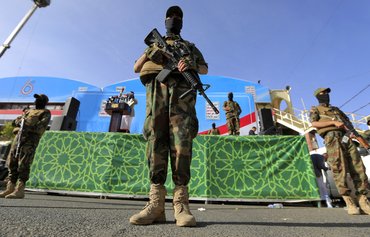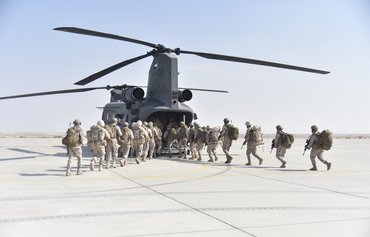ADEN -- The United States' recent appointment of a special envoy to Yemen has raised hopes for a diplomatic solution to end the six-year conflict that has pitted Yemen's government against the Iran-backed Houthis (Ansarallah).
Special envoy Tim Lenderking, appointed February 4, will be tasked with negotiating with both sides and finding a peaceful solution to end the war, which has seen Yemen descend into the worst humanitarian crisis in modern history.
Within days, Lenderking had taken part in discussions with Gulf state leaders and the British Foreign Office about joint efforts to end the conflict in Yemen.
Yemen's Ministry of Foreign Affairs said it welcomed the appointment, as did UN special envoy to Yemen Martin Griffiths, who described it as a "positive step towards strengthened international and diplomatic engagement".
![US special envoy for Yemen Timothy Lenderking appears on a pair of screens during a news teleconference at the State Department in Washington on February 16, as State Department spokesman Ned Price stands at the podium. [Andrew Harnik/POOL/AFP]](/cnmi_am/images/2021/02/18/28498-US-Yemen-envoy-600_384.jpg)
US special envoy for Yemen Timothy Lenderking appears on a pair of screens during a news teleconference at the State Department in Washington on February 16, as State Department spokesman Ned Price stands at the podium. [Andrew Harnik/POOL/AFP]
The Gulf Co-operation Council (GCC) said it viewed Lenderking's appointment as a positive addition to efforts aimed at resolving the conflict in Yemen.
With this move, the US government has indicated it wants to be directly involved in steps to resolve the crisis in Yemen, said political analyst Wadih Atta.
"This is a new, significant and influential event in the course of the war," he said, adding that the move is especially welcome, since it has become evident that the warring sides are unable to end the conflict themselves.
Alarm over Marib advance
However, the Iran-backed group continues to aggravate the situation.
The United Nations and United States on Tuesday (February 16) voiced alarm over the Houthis' advance on Marib, the government's last northern stronghold.
The Houthis this month resumed an offensive to seize oil-rich Marib, after briefly pausing their efforts in October.
The city's loss would be a major blow for Yemen's government, but also would threaten catastrophe for civilians, including hundreds of thousands of displaced people sheltering in desolate camps in the region.
"An assault on the city would put two million civilians at risk, with hundreds of thousands potentially forced to flee -- with unimaginable humanitarian consequences," said Mark Lowcock, UN undersecretary general for humanitarian affairs.
"Now is the time to de-escalate, not to add even more to the misery of the Yemeni people," he said.
The UN Office for the Co-ordination of Humanitarian Affairs (OCHA) estimates a million Yemenis have sought refuge in Marib since the beginning of the war to escape Houthi violence.
Lenderking urged the Houthis to "halt their assault".
"Ending this war through a lasting political solution is the only means to directly end the humanitarian crisis that has devastated the Yemeni people," he said.
'Objective map for peace'
"I think the presence of a [US] special envoy to Yemen will contribute to the development of an objective map for peace, especially given Lenderking's previous experience in the region," said Abdul Hafeez al-Nahari, director of the media department at Yemen's General People's Congress (GPC).
Lenderking previously served as Deputy Assistant Secretary of State for Arabian Peninsula Affairs in the US State Department's Near East Bureau, and his prior foreign postings include Saudi Arabia, Iraq, Kuwait and Syria.
Peace would start with the cessation of hostilities, and culminate in a comprehensive political agreement that would respect Yemen's unity, safety, independence and stability, and regional and international interests, he said.
Al-Nahari said the US move comes at the right time, considering the dire economic situation in the country, especially in areas under Houthi control.
Yemenis cannot endure more killing, hunger, poverty, disease and siege, he said, nor can they afford to "intellectually fall behind" as a result of the war.
Social activist Khaled al-Baadani said the Yemeni people have suffered enough, expressing his hope that a US diplomacy could make peace a reality.
The peace negotiations that took place in the past were marred by the Houthis' intransigence and their destructive actions, he said.
An end to the bloodshed
The Yemeni government says it has been working to stop the bloodshed and establish lasting peace by supporting Griffiths and offering concessions in order to allow for the resumption of the peace process.
But these efforts have been thwarted by the Houthis' subservience to Iran and the IRGC, which have been providing them with military and financial support to prolong the war and exert pressure on the countries of the region.
Yemen's Deputy Minister of Human Rights Nabil Abdul Hafeez said the government supports peace efforts that abide by the Gulf Initiative, the output of Yemen's National Dialogue and UN Security Council Resolution 2216.
"We are awaiting the results of the US envoy's efforts," he said, adding that the new US envoy should pressure Iran and its allies in Yemen to commit to achieving a lasting peace.
He pointed, however, to what he described as the uncompromising stubbornness of the Iranian regime, saying this position can be seen in remarks made by Hassan Eyrlou, Iran's ambassador to Sanaa, on January 2.
Eyrlou described the Houthis as the "beating heart of the Iranian axis".

![A Yemeni woman displaced by conflict holds her 2-year-old son, who weighs only five kilogrammes, outside a shelter in al-Hodeidah province on February 15. [Khaled Ziad/AFP]](/cnmi_am/images/2021/02/18/28465-Yemen-conflict-displaced-600_384.jpg)






